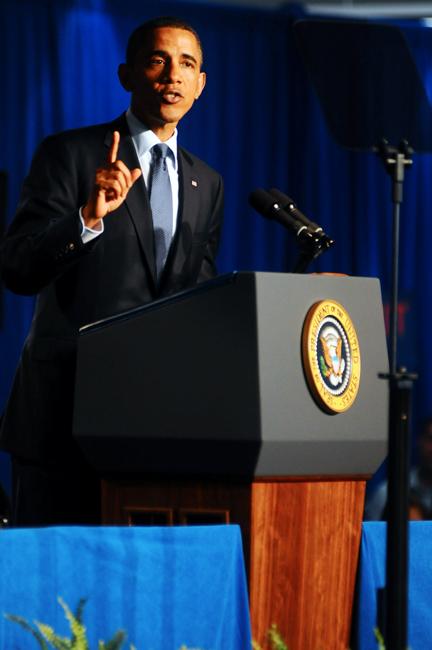
© NCSU Student Media 2011
President Barack Obama speaks at Cree, Inc in Durham Monday, June 13, 2011. Obama spoke about the importance of science and engineering jobs to sustain a competitive edge in the global market. Photo by Brent Kitchen
President Barack Obama’s job council made its way to North Carolina’s Research Triangle Park and N.C. State Monday to discuss the role of renewable energy, technology and biopharmaceuticals in the nation’s economy.
Secretary of Commerce Gary Locke led the council’s conference on energy policy and job growth at the Alumni Center on Centennial Campus in the morning. North Carolina Sen. Kay Hagan, a Democrat, attended the conference and said North Carolina is center of innovation and research in scientific fields.
“The president could not have picked a better state to host his council on jobs and competitiveness,” Hagan said. “Not only do we support the best workforce in the country, but we are home to the world’s best universities, best community colleges and many of the world’s most pioneering and innovative companies. We are a state on the move.”
The council discussed smart grid technology and engineering education. Alex Huang, director of the FREEDM Systems Center on Centennial Campus, led the secretary around the center’s facilities, explaining that smart grids — efficient electric grids that blend Internet communications in delivering energy — will be the future of America’s energy distribution.
Chancellor Randy Woodson, who was also present at the morning conference, said the issues the council discussed are pertinent to the University.
“This is a University that is all about job creation,” Woodson said. “The science and technology that goes on at N.C. State has already shown for decades that we can spin out new companies, new industry and we can reinvent new industry like we are with the FREEDM Center. They’re here because we can do great work.”
The conference hosted council members, including General Electric CEO Jeffrey Immelt, Comcast CEO Brian Roberts, venture capitalist John Doerr and IBM CEO Samuel Palmisano. The conference also brought together NCSU alumni in the energy industry.
Rob Manning, executive vice president of the federally owned utility Tennessee Valley Authority, graduated in electrical engineering in 1978. He said the country “does not have the energy policy right.”
“The energy systems in the U.S. are not flexible enough to deliver what the economy in the U.S. really needs,” Manning said. “I think this conference is a small step forward, not a big step forward, to get government and industry and academia talking. Those things can only result in good things going forward — that conversation.
After arriving at Raleigh-Durham International Airport Monday afternoon by Air Force One, Obama addressed a crowd of engineers and local entrepreneurs at Durham-based Cree Inc., the world’s leading producer of LED technology. Cree was started by NCSU graduates. Obama said the U.S. must expand its engineering workforce to compete in the global market and stimulate jobs.
“Today … we’re announcing an all-hands-on-deck strategy to train 10,000 new American engineers every year,” Obama said. “Our Jobs Council, led by Jeff Immelt, they’re doing this not counting on a whole bunch of federal funding. Private sector companies are teaming up to help us promote STEM [science, technology, engineering and math] education, to offer students incentives to finish those degrees, and then to help universities fund those programs. They’re going to double their summer internship hiring.”
The president said this quota will allow the U.S. to compete against nations like China and India in the increasingly volatile world of technological advancements. Dean of Engineering Louis Martin-Vega said NCSU could contribute to that standard.
“Not too long ago, only one in every three students who started in engineering actually graduated,” Martin-Vega said. “Now the national average is half. The main emphasis is the effort of retention. The best way to look at increasing the number of engineer graduates in the country is by increasing the number of students that come and stay in engineering. We are working here to make sure our students have all the tools appropriate to advance in their fields.”
Technician will have more on this story in Thursday, in print and online.